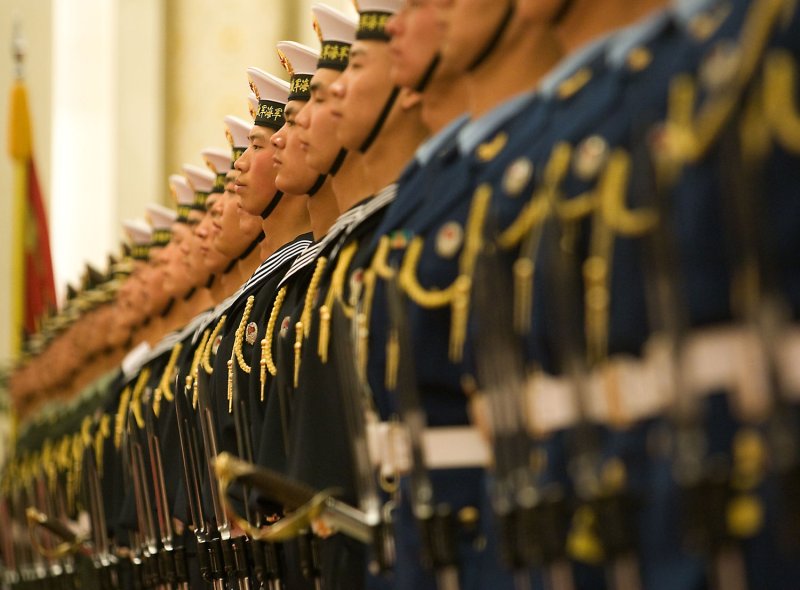1 of 5 | Chinese soldiers perform honor guard duties at the Great Hall of the People in Beijing March 23, 2009. (UPI Photo/Stephen Shaver) |
License Photo
WASHINGTON, March 26 (UPI) -- China is expanding its military capabilities at high speed, and no one knows what they are going to do with them, a new Pentagon report warned.
The U.S. Department of Defense issued the report, "Military Power of the People's Republic of China," Wednesday. It said that China's "armed forces continue to develop and field disruptive military technologies," with nuclear, space and cyber warfare all mentioned. The Pentagon said such developments were upsetting the military balance in Asia.
The report added, "Much uncertainty surrounds China's future course, particularly regarding how its expanding military power might be used."
China took exception and told the United States to "drop the Cold War thinking."
The report was published at a particularly tense time for Sino-American relations. Earlier this month the U.S. survey ship USNS Impeccable was harassed in international waters beyond the 12-mile limit by the Chinese while operating near Hainan Island, a major Chinese strategic bomber and submarine base.
And on Monday, Zhou Xiaochuan, the governor of the state bank of China, published remarks on the bank's Web site suggesting that the U.S. dollar be replaced in an expanded International Monetary Fund system as the main reserve currency of the world.
Gaffe-prone U.S. Treasury Secretary Timothy Geithner made some remarks Wednesday appearing to agree with Zhou's conclusions. He told the Council on Foreign Relations in New York that he would be open to China's suggestion that the IMF Special Drawing Rights determine value with an increased pool of currencies. The dollar is one of four currencies now used, and a change would cause a diminution in prestige, if not real value, for the U.S. currency.
China holds more U.S. treasury bonds than any other country -- $681 billion in November. But the Chinese are worried that the unprecedented spending plans of President Barack Obama and the Democrats who now control both houses of Congress will cause serious inflation and drastically reduce the value of their dollar holdings.
If China dumps all or most of its dollars, Japan, the second-largest holder of U.S. treasury bonds, will follow suit, and the United States could find itself bankrupt overnight with a nightmare hyperinflation comparable to that of Zimbabwe today or of Weimar Germany in 1923.
U.S. officials, therefore, are trying to convince the Chinese to keep investing in treasury bonds. That was why Secretary of State Hillary Clinton made Beijing and Tokyo her first destinations after taking office.
It is true, as The Wall Street Journal repeatedly editorializes, that China and the United States are locked tightly in a relationship of extreme mutual dependence. But that two-way dependence, contrary to conventional wisdom, has only fueled their mutual mistrust rather than eased it.
Over the past decade the Pentagon has institutionalized its annual and special reports on China's military developments to alarm a succession of Republican-dominated congresses and two-term Republican President George W. Bush to keep the huge budgets flowing on Capitol Hill. But now the Democrats are in office, and an economic crisis has been sweeping the United States and the world since last September's Wall Street meltdown. That means U.S. defense budgets are going to be slashed, regardless of the Chinese buildup.
These developments, however, do not mean the new Pentagon report is either alarmist or wrong. If anything, it appears on the sober side.
United Press International's own China military-affairs analyst Andrei Chang has repeatedly documented in great detail the extent of China's plans to build up its navy to project power across the Indian Ocean and its moves to revise its naval doctrine to cover protecting its trade and vital interests that already surpass that of the United States in many of the major countries of sub-Saharan Africa. China's trade and strategic interests are also growing rapidly with major resource-rich nations of Latin America like Venezuela, Brazil and Chile.
The Pentagon report noted that the People's Liberation Army budget has soared from $27.9 billion in 2000 when President Bill Clinton was still in office to $60.1 billion last year. And it warned that the latest figures may be an underestimate by as much 250 percent. The real figure in total defense spending for last year was probably between $105 billion and $150 billion.
"China's ability to sustain military power at a distance remains limited, but its armed forces continue to develop and field disruptive military technologies, including those for anti-access/area denial, as well as for nuclear, space and cyber warfare, that are changing regional military balances and that have implications beyond the Asia-Pacific region," the report warned.
The report also confirmed Chang in his documented assessments that the PLA continues to give priority to building up a formidable tactical theater superiority over Taiwan, emphasizing surface-to-sea and surface-to-air missile capabilities. Effectively, China's missiles already deny U.S. super aircraft carrier battle groups the ability to operate freely in the Strait of Taiwan as they did in 1995 and 1996.
"China's armed forces are rapidly developing coercive capabilities for the purpose of deterring Taiwan's pursuit of de jure independence," the report said.
China doesn't begin to have the long-range bomber force that the United States does. It can't compete with the U.S. fleet of nuclear powered state-of-the-art strategic missile submarines, and its aircraft industry isn't close to producing combat fighters that can stand up one-on-one to the U.S. Lockheed Martin/Boeing F-22 Raptor or the Lockheed Martin F-35 Joint Strike Fighter.
But China is expanding its armed forces at a rapid rate, as the report documented, and with 8 percent growth a year and almost $2 trillion in foreign currency holdings overall, it can afford to.
The 20th century was the American one. The new Pentagon report, coming only two days after Zhou Xiaochuan's warning shot at the dollar, suggests China's leaders are ready to make the 21st century their own.















